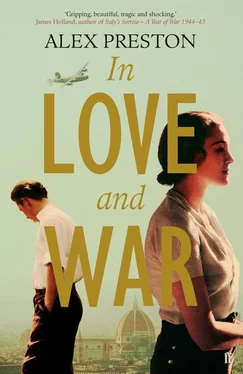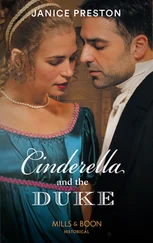Some good news, finally. I mean not only that, so far, the British pilots have managed to fight off the Hun. And wasn’t this how we always dreamed the wars of the future would be fought, high up in the clouds, sharks of the air ripping chunks off each other? But even better, Goad discovered that Carità has left Florence, joined up and gone to fight in Albania. The town can breathe.
Also, Ada loves me. I waited until we’d worked late recording a show on The Decameron . We were still in the studio at nine in the evening. I kept slipping up on the passages in Italian, clanking mistakes in my translation, partly because it was reminding me of first being in Florence and reading the book in the loggia of the Palazzo Arcimboldi with Fiamma. Finally we were done and Ada pulled her scarf around her head, started buttoning her jacket. I asked her to join me for a drink and was surprised when she said yes. I found a three-quarters-full bottle of Chianti in the kitchen and led her up to the roof of the church.
We’ve been so busy, too busy even to come up and admire the sunsets, and the rooftop has grown over. Weeds spew out between tiles, the little garden where they must once have planted raspberries or tomatoes is now dense with wild fennel, yellow flowers shooting up through chicken-wire. We sat on the roof and drank our wine, and Ada said something about how Florence reflects her hills, how the undulations of the rooftops mirror the rise and fall of the land. It struck me as beautiful and true, and I thought back, again, to sitting on another rooftop with Fiamma and seeing the purple darkness reaching up to cold heights. I told Ada all about Fiamma, or almost all. She listened very carefully and was quiet afterwards. I leant over and kissed her, and she didn’t resist, though nor was she anything more than politely encouraging. We spoke for a while longer and then she invited me for dinner the next evening.
I’d imagined a lonely existence for Ada away from the studio. Whenever I telephoned her, after drinking too much and feeling maudlin, I pictured her with some serious book in her lap, reaching out a hand to the telephone and then drawing it back. In fact, her house is something of a salon. It wasn’t just me for dinner. I’d made an enormous effort with my clothes, I bathed and perfumed and pomaded. I’d selected a copy of The Oxford Book of Modern Verse, edited by Yeats, to give to her. It was a present from Anna, Christmas before last, and it felt like a good sacrifice, to make it Ada’s.
I arrived at the via dei Forbici. I could hear conversation echoing in the stairwell as I made my way up. The door to the Liuzzi apartment was open and there were six or seven young people with Ada in the kitchen, more grouped around an older man with thick spectacles and thinning hair who sat on the divan in the drawing room. I’d brought a bouquet of flowers — lilies from the stall in front of the Villa Ventaglio. I stood, holding them stupidly, until Ada swept out of the kitchen and kissed me and took the flowers and cooed over the book, and seemed friendlier and more relaxed than she’d ever been with me before. It wasn’t the tête-à-tête I’d been hoping for, but, rather despite myself, I had a smashing time. The party was to celebrate the release of one of Ada’s friends — a thin-faced, quiet, good-looking man called Bruno Fanciullacci — from gaol. I saw Ada’s eyes slide to him repeatedly, monitoring his position in the room. He carried a matchstick in the corner of his mouth which bobbed gently as he spoke. He was the son of one of the leaders of the local Communist Party and had been arrested on a series of trumped-up charges, given seven years and released after two.
The older man was Piero Calamadrei, a Professor of Law at the university who’d led the legal challenge to Bruno’s imprisonment. Whenever he spoke, the rest of the room fell quiet, although his words came in jagged, impressionistic bursts that were hard to follow. We sat on the floor with our bowls in our laps — Ada had made lasagne — and the young people talked as they ate, shouting across each other and filling beakers with wine from unlabelled bottles, looking up reverently at the Professor whenever he held forth on politics, or literature, or law. Ada made sure that I was included in conversations, translated words she thought might be difficult for me, trailed her fingers through my hair as she passed. She introduced me to her friends with a kind of protective warmth I found very touching. It made me realise how, after three and a half years in Florence, I know very few Italians. Shameful, really. This was a strange bunch, though.
The Professor seemed to take against me at first, referring to me as Ada’s “pet Fascist” and saying, with a little wrinkle of his nose, that he’d listened to my programme on d’Annunzio. No praise, or comment, just the nose.
In one corner sat a famous cyclist, Gino Bartali, who was a friend of Ada’s father and was cheerfully and palpably in love with his new wife, Adrianna. They spoke only to each other, smiling around the room every so often as if allowing us collusion in their bliss. A group of serious young men surrounded Bruno, huddled on one side of the room, watching him move the matchstick around his mouth. They all looked rather tired and ill-fed and trim-moustached. Three young women in Agnes Ayers turbans, smoking Sobranies, stood in the doorway, looking over at the men and letting out little flustered laughs. Finally, sitting with Ada and me, a lady called Maria Luigia Guaita, a plump, friendly sort from the Monte dei Paschi bank where my account is held. I hadn’t quite worked out at this point what should perhaps have been rather obvious — that this rag-tag bunch at Ada’s house were the Florentine chapter of Giustizia e Libertà, that the Professor was their leader, that Ada was testing me somehow by bringing me along.
After dinner, with the French doors open to the square below, the Professor began to talk about books. I lost a little of the subtlety, even with Ada whispering occasional translations in my ear, but he was speaking about the role of literature in politics, the temptation for writers to retreat into symbol and allegory, rather than recording the stony facts of the world. He said it was the writer’s duty to speak for those who couldn’t speak, who were trapped or overlooked or oppressed. He said, in times like these, novels should be written with broken fingers, and all poets’ eyes should be black. He fixed me then and asked me if I wrote at all, and everyone was silent.
I didn’t see what else I could do; I told him about In Love and War, about Hulme and how writing about him was a way of writing about my father. Their friendship, I thought, had driven my father to Fascism. That staying true to Fascism, Mosley and violence, was all a fidelity to his dead friend. I’d always felt, I told them, that I was out of place, and that my attempt to make Hulme a hero was an attempt to forge someone from my father’s world, someone with fierce, Fascist ideas, into a laudable figure. I could show Hulme, a copy of Sorel from the London Library in one hand, a gun in the other, living the philosophy he preached: heroism, duty, standing up for those values that made life worth living. But I’d buggered it up. The novel didn’t work. I was writing it with an ugly hand over my eyes. By the end I was exhausted. You must remember I did all of this in Italian, which gave it a kind of clumsy honesty.
Ada raised her glass to me. The Professor swallowed the contents of his own, seemed satisfied, and began to ask me questions about Auden and Spender. He thought Pound a great poet, he said with a sorry smile. Yeats, too. Now that my ladder’s gone, he quoted in English, I must lie down where all the ladders start. In the foul rag and bone shop of the heart. Bloody good. Then everyone began to talk and argue, and a group of university students turned up, and with them a young, pretty girl with white-blonde sparkle, Tosca. Everyone calls her La Toschina. Her boyfriend, a tough-looking fellow named Antonio Ignesti, seemed to take a shine to me — heavy Sicilian accent he had, barely caught a word. He kept urging me to drink from his bottle of grappa and soon it was two in the morning and people were walking out into the night. Finally I was left with Ada on the balcony, looking over the darkened square.
Читать дальше












